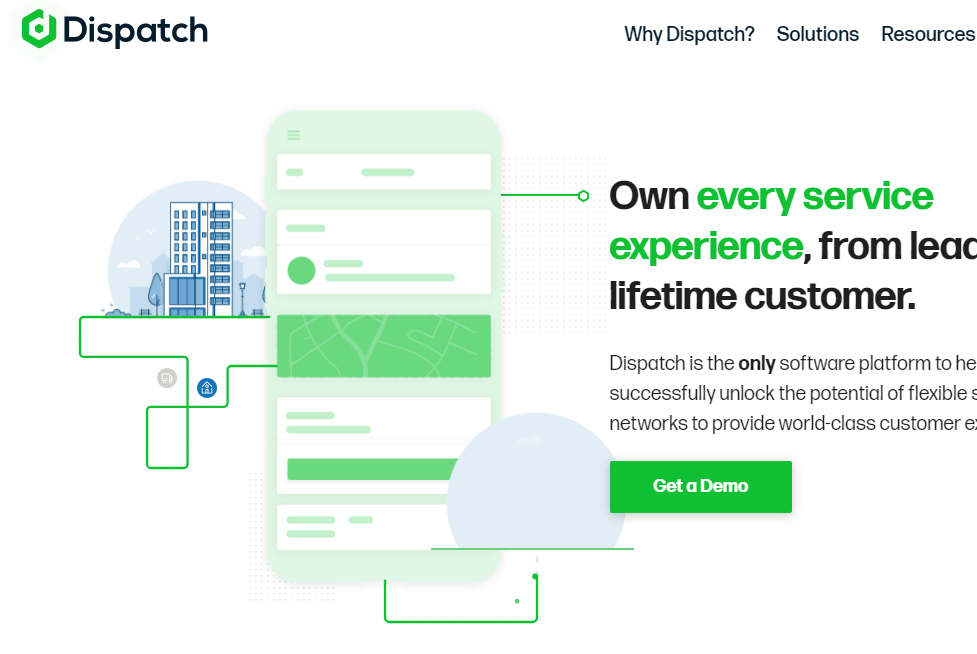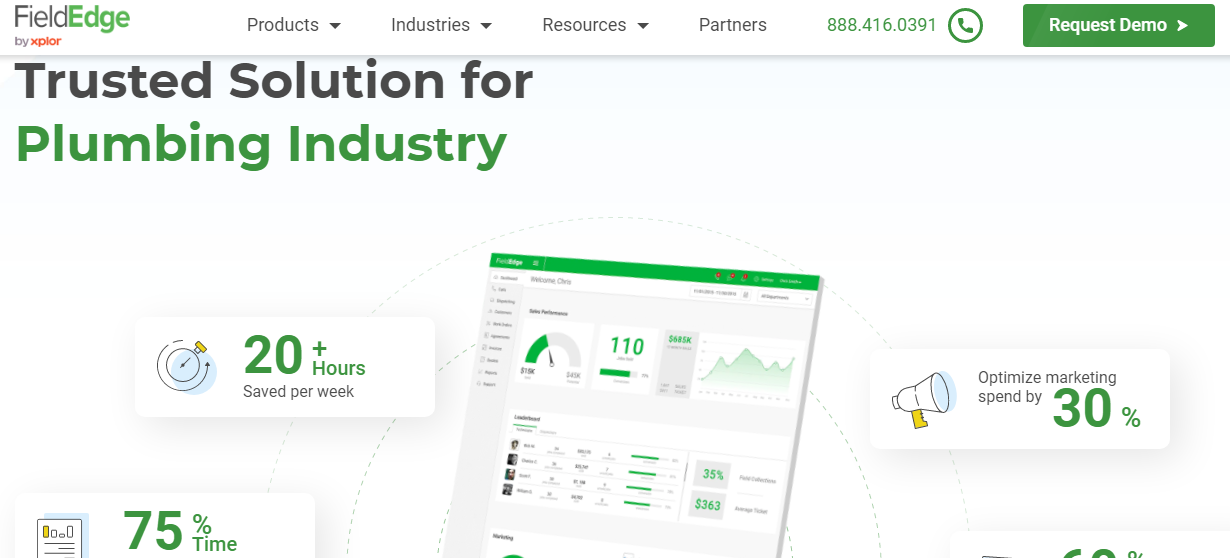
Any company that provides field service is familiar with the difficulties that arise from overseeing a large staff of technicians who perform numerous tasks at various locations each day. reports on the back end are crucial for maintaining the satisfaction of back office staff, field technicians, and customers.
This guide will cover everything you need to know about the various field service management software products that are available to help you achieve all of these objectives.
Field service is a general term for any service provided off company property, typically at a client or customer’s location. In general, any business that relies on workers or contractors to manage assets outside of the company’s physical location could be said to engage in field service, which could include sectors like sales or home healthcare.
The building trades, which include sectors like property management, landscaping, HVAC, electrical, plumbing, and construction, however, frequently use field service as a crucial procedure. In these situations, field service may entail delivering, repairing, installing, or maintaining machinery, systems, and buildings. This makes it crucial to be able to track how those resources are being used and make sure that client and customer needs are being met because these industries frequently have workers and assets being used in the field at job sites or client properties.
What Is Software for Field Services Management?
In the past, service requests had to be manually scheduled and assigned to employees on a paper schedule or in a spreadsheet after being phoned in by a customer. Customers and the back-office staff would frequently be in the dark about the status of the job while the employee was out in the field. When the job was finished, workers would return to the office with paper records, and staff would send actual invoices for payment.
All of these problems are addressed by field service management software, which develops more effective, tech-enabled tools for fielding service requests, scheduling and dispatching employees, corresponding with clients, and swiftly processing payments. Everyone saves time and has access to better information thanks to the automation of many of these processes.
The advantages of field service management software include:
- Enhanced effectiveness.
The majority of field service management software comes with tools for automating billing and customer interactions, tracking asset and inventory usage, reporting on productivity, and optimizing employee work schedules and service routes. When companies use these tools, it allows them to take on more work and finish it with a higher profit margin while sparing their employees from time-consuming or redundant tasks.
- Error reduction
Businesses that use field service management are less likely to experience errors in scheduling, completing, and billing work because these systems have features like automated functionality around communication, invoicing, and scheduling, as well as optimized service routes and real-time updates from the field. These changes can simplify business operations and raise client satisfaction.
- Fulfilling client requirements.
Customers’ expectations for their interactions with service providers are rising, and many field service management tools are designed to deliver on those demands. Customer portals with simple online booking, automated notifications, reports, and invoicing, as well as greater capability around customer-friendly features like consumer financing and recurring service plans, have been developed by software providers.
- Cost
For many businesses, especially smaller shops, the cost of field service management software will be the biggest barrier. When fees can easily cost hundreds or even thousands of dollars annually, there may not be enough efficiency improvement for businesses that do not deal in a high volume of jobs to justify the cost.
- Moving records
Moving records to the new system poses a significant challenge for companies that do decide to use field service management software. It can be difficult to import data from spreadsheets and other computer files, and if the company has been keeping paper records for years (or decades), it might take a long time to enter the data.
- Change management
The switch to a new software system can be difficult for companies that have long used a single process for field service management. The key to a successful implementation is employee training on how to use the software and making sure that the new tools are actually adopted and integrated into the business’s workflows. However, doing so successfully requires time and resources.
The Best Field Service Management Software
1. Housecall Pro

Housecall Pro will provide the best overall feature and price combination in field service management software for the majority of businesses. More than 15,000 businesses use Housecall Pro, which was created to be useful across a variety of service industries such as HVAC, plumbing, electrical, landscaping, and more.
With additional tools like live GPS tracking and customizable reports, Housecall Pro offers core functionality around managing jobs and optimizing scheduling and dispatch. With online booking and automated text notifications, customer interactions are made simple. Housecall Pro also has features for targeted marketing, recurring service plans, and consumer financing to aid in closing deals and generating revenue. With automated invoicing, support for mobile card payments, and instant payouts, payment is also made simple.
Although Housecall Pro has a large number of useful features, there are some areas where it could be improved. One is that, unlike other top options, Housecall Pro does not currently provide tools for inventory management. Another is that some features are more difficult to access on mobile, which results in decreased field accessibility.
2. Dispatch

Dispatch was founded in 2013, making it a relatively recent entrant into the field service management software market, but it already enjoys a strong feature set and a reputation as an industry leader. For scheduling jobs, monitoring technicians’ activity, and interacting with customers via a variety of channels, dispatch provides powerful tools. In order to assess performance at the technician level as well as across the entire organization, dispatch also has excellent reporting and analytics features.
The ability of your chosen FSM solution to integrate with your company’s current CRM and ERP systems is a key factor for enterprise businesses, and Dispatch meets this requirement. With the help of Dispatch’s support for integrations with other significant CRM and ERP systems like Salesforce, Oracle, and Microsoft Dynamics, your company can use its current resources and procedures while adding cutting-edge field service resources.
Starting at $99 per month for a maximum of five users, Dispatch has higher pricing tiers available to add users and access additional features.
The software is less suited for the building trades than other top options on the market, positioning itself as suitable for scheduling across a number of other industries, such as manufacturing and retail. This is Dispatch’s main drawback. Another choice might be more appropriate for users interested in industry-specific tools for a specialty like HVAC or electrical.
3. FieldEdge

In the 1980s, HVAC service technicians created FieldEdge, a pioneer in field service management software for HVAC companies. Although it now provides support for other sectors, such as plumbing, electrical work, and appliance repair, FieldEdge’s extensive HVAC experience makes it the best option for HVAC companies.
In the HVAC industry, FieldEdge has a broad range of features that address all of the essential aspects of field service management. This comprises effective dispatch and scheduling tools that enable managers to assign technicians according to their skills and the location of the job, thorough customer records that are simple to access on a mobile device in the field, and automated invoicing and support for payment in the field. In order to increase sales, FieldEdge also provides QuickBooks integration as well as marketing and sales enablement tools.
Conclusion
Software for field service management can be used on a desktop computer or as a cloud-based or on-premise solution. Desktop software can only be accessed on devices where it has been installed, whereas online software can be used from any device with an internet connection.